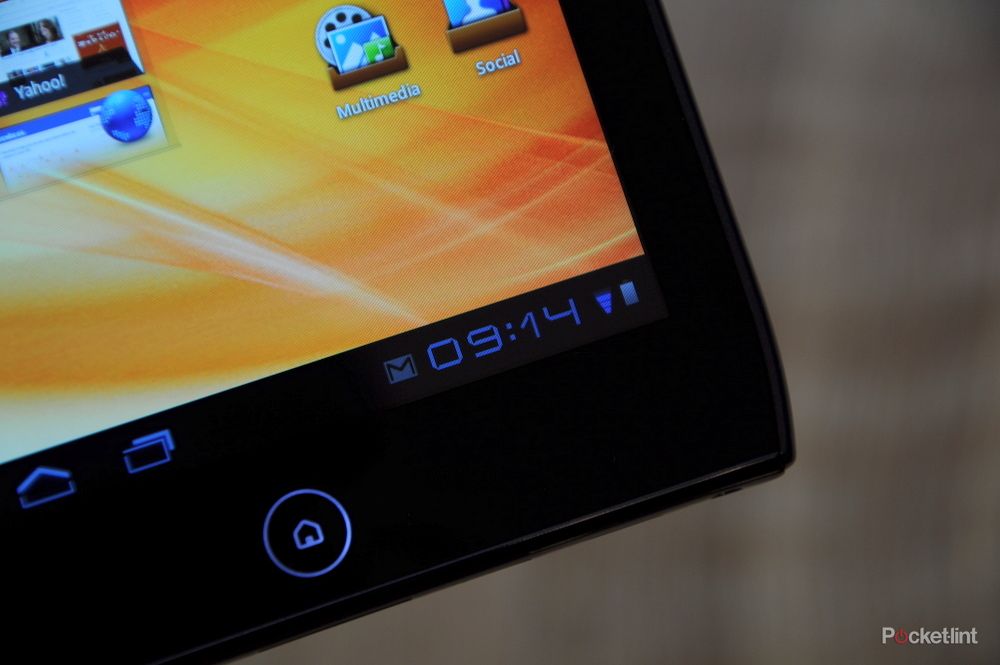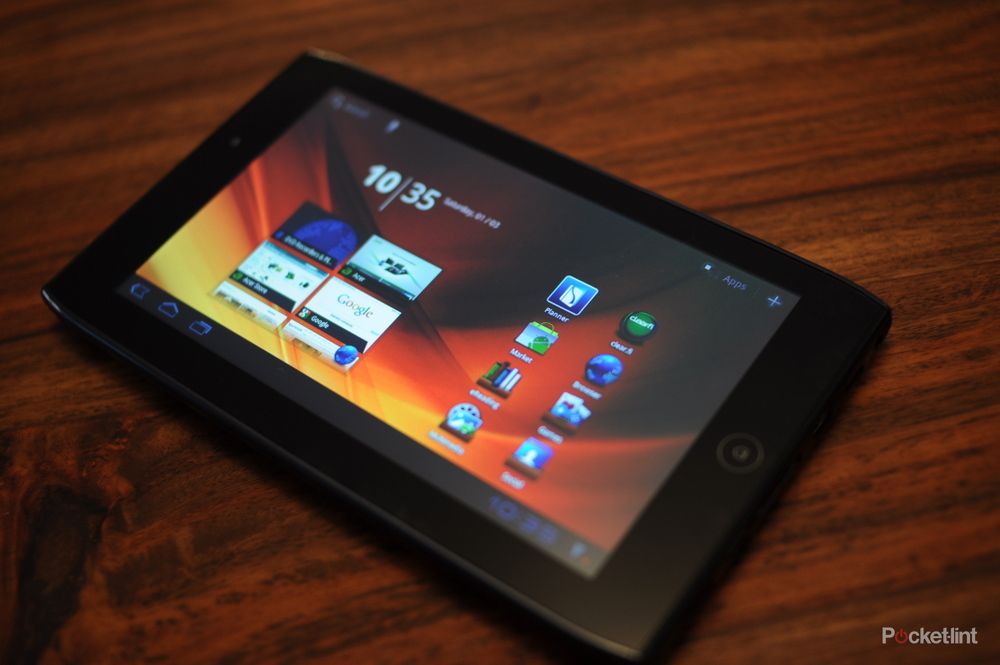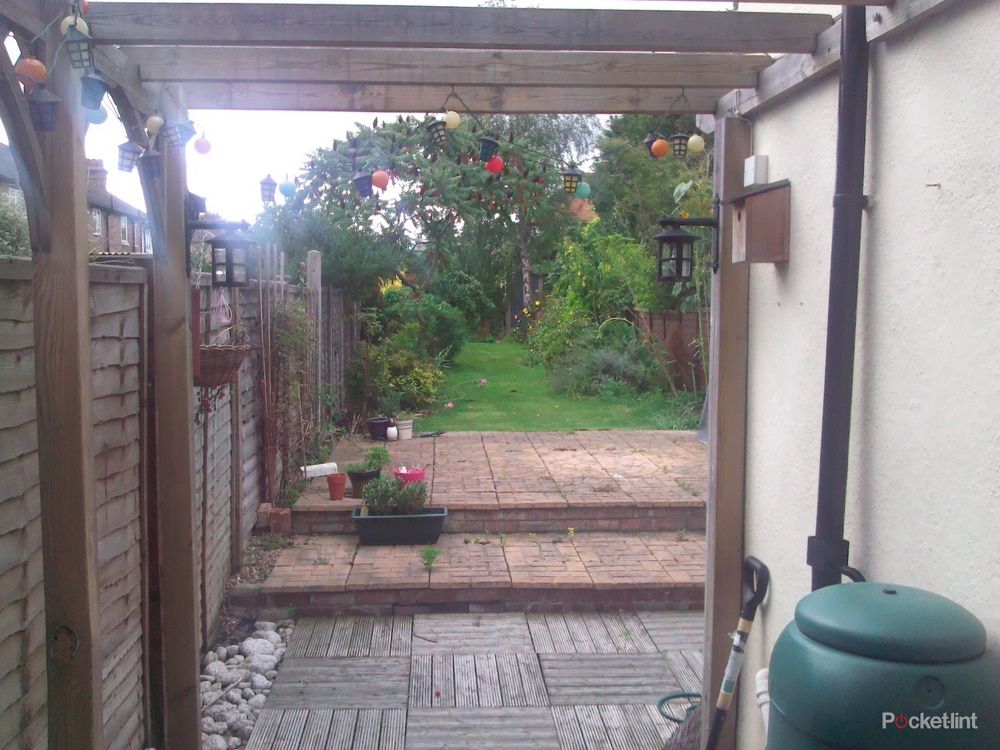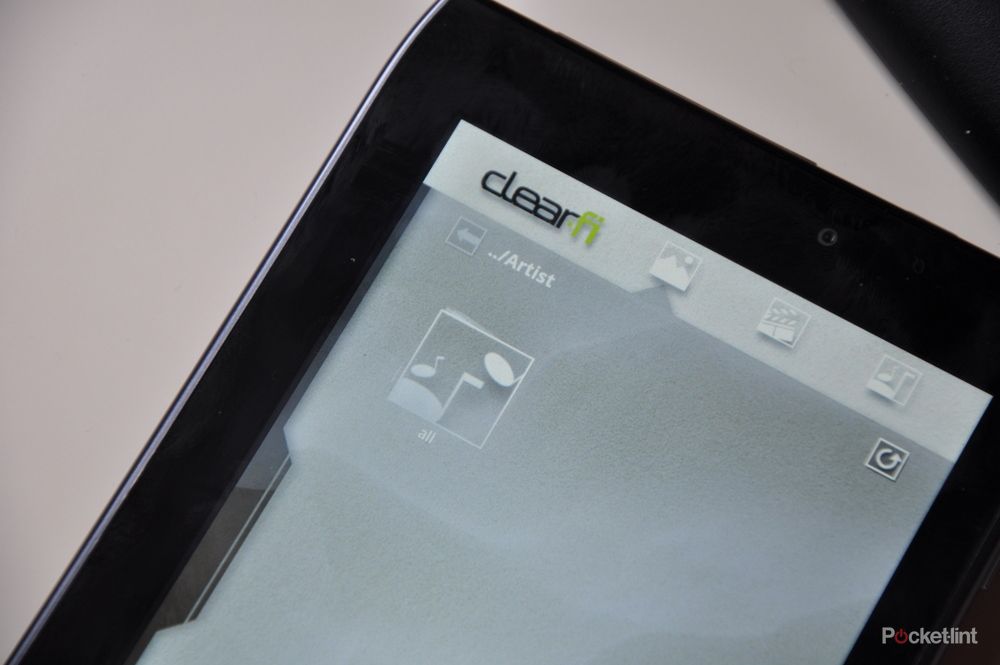Steve Jobs doesn't like 7-inch tablets. Hardly surprising, given that Apple only has one tablet, and it's not 7-inches. But Pocket-lint likes all tablets, especially ones that give the people what they want: choice.
Our quick take
Although there's plenty to moan about with the A100, we did like many things about it. The screen is sharp, even though the viewing angle is outright weird. We love the power of the device, and we think it's got a lot of potential for people who want a tablet for gaming.
That said, the A100 is a bit chunky and the design just misses slightly for us. There are a lot of sockets and buttons around the device, and we're not totally convinced by the need for a propriety dock, USB and proprietary power connector.
DLNA, or clear.fi, as it's known, is a mixed bag. We could share photos and video with our Windows computer, but trying to stream anything from DLNA servers was just impossible.
The battery is also less capacious than we'd really like, and that has a big impact on the usability.
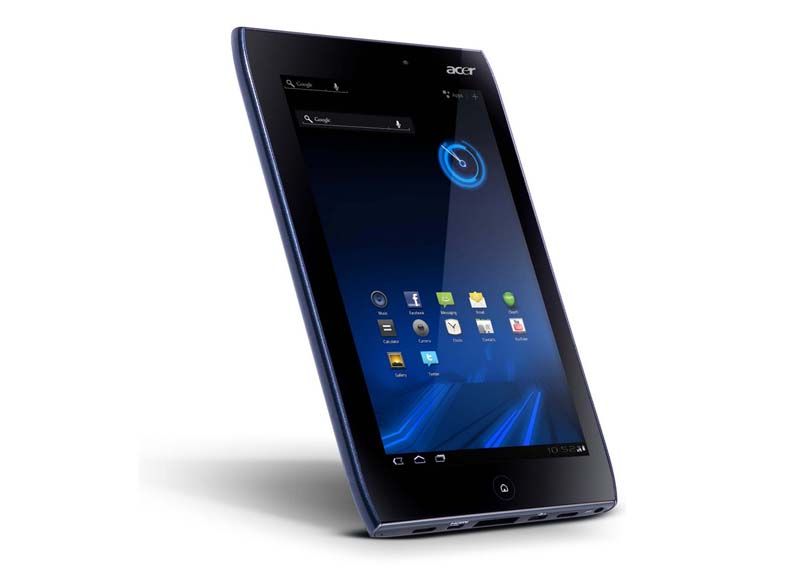
Acer Iconia A100 - 3.0 / 5
| FOR | AGAINST |
|---|---|
|
|
The Iconia A100 is Acer's most recent entry into the Honeycomb tablet market. It's small, sturdy and powerful too. It costs around £300 for the Wi-Fi only model we're testing here, comparable with Samsung's 7-inch, Wi-Fi only Galaxy Tab, the P1010.
Mostly buttonless
As is the trend, the A100 has only one "hardware" button. This is an Apple-esqe design decision that sort of works, but strikes us as a little pointless. Either have no buttons on the face of the device, or festoon it with the little chaps. There seems to be no point in going halfway. Also, because the home button is a touch-sensitive control, it's all too easy to press it when you're holding the tablet. This means you'll often find yourself dropping out of what you were doing, because you pressed the home button by accident. There's a reason Apple has a physical key on its devices.
Away from the front though, there are plenty of flaps and buttons on the A100. At the top, there's a power button and headphone socket. On the right-hand side, there's an orientation lock switch as well as a volume rocker switch. At the bottom of the right side, there's a socket for a microSD card. There is also what looks like a SIM card socket, which has a blanking plate over it. Clearly, there will be a GSM A100 at some point in the future. Indeed, the user manual makes mention of installing a SIM card before you turn the device on.
At the bottom of the A100, there is an HDMI output, proprietary dock connector and USB socket. You can also see the twin-speakers and the daft proprietary power connector. It's worth mentioning the sound here too, because although it has Dolby Mobile, the built-in speakers aren't all that powerful. Headphones tell a better story though, and audio quality is pretty good.
Weighty but compact
One of the other things we noticed about the A100 is its decent heft. At 470g, it's quite a lot more weighty than the Galaxy Tab 7-inch - which was 380g. The problem, however, is not so much what it weighs, but that it really feels like it weighs a lot.
It does, however, have the advantage of fitting in to much smaller spaces than an iPad or Motorola Xoom would. This means that carrying it around is much more practical, and we think that as a result of that, you're much more likely to carry it around than a 10-inch tablet.
Dim screen and other issues
During our testing we noted that the A100's screen wasn't really very bright. Indeed, it was so dim that we had to turn off the automatic brightness control and stick it to the maximum setting. This was inside too, so outdoors, you're really going to struggle to see what's going on in bright light.
With the device on less than full brightness, we also noticed a slight shimmer on the screen. This made it slightly more difficult to use the device, and again required we boost the backlight to full to mostly get rid of the problem.
On the whole, the screen was sharp though, which we really liked. It has the same resolution as rival ViewSonic's ViewPad 7x at 1024 x 600, but that's really not bad for a 7-inch tablet. Interestingly though, like the ViewSonic, the viewing angle is very strange on the Acer. In one direction, it's quite good. But flip it the other way, and it washes out really badly. This is confusing, and irritating, because we found that holding it with the home button on the right, and tilting the tablet backwards was the worst angle. But this is the very angle at which most people will hold the tablet.
Wi-Fi troubles
In our test environment we use two routers to provide two Wi-Fi networks. For web browsing, we had no problem on either. When it came to access Google's services like Gmail and the Android Market, we came unstuck. The market kept asking us to authenticate as a Google user, while Gmail refused to allow us to access new mail.
Other Android devices on our test network have no such problems. We have several Android phones and a Samsung Galaxy Tab all working fine, and we've never seen anything like this before. A full reset fixed the problem, but it could easily come back again later.This could have simply been a Google authentication error, but its persistence was troubling.
Camera
There are two cameras on the A100. The rear-mounted is 5 megapixel, with the front-facing one offering 2 megapixels. This is good news for people looking to make video calls, although the number of apps that support this functionality are pretty small. Skype is adding support for new devices all the time though.
The rear camera is fine for basic uses. We don't think many people will use a tablet as a camera all that often, so we're not too concerned with the quality. It is, however, not very good, so if a good camera is important to you, this isn't the tablet for you.
On the plus side, the camera app is gloriously simple to use, reacts quickly and doesn't confuse with lots of options.
Nvidia Tegra power
Although the processor in the A100 isn't the most powerful we've seen, Tegra certainly helps the performance of the tablet no end. Games, in particular, are very slick and speedy. As are the menus, indeed, the whole device feels very slick indeed, and we like that.
There are options open to Tegra-powered devices too, there's a special gaming zone where you can grab games and demos, which is handy if you're looking for a little more content to cheer up your day.
The Processor is a dual-core A9 ARM chip, which runs at 1GHz along with the Tegra GPU, which handles the graphical donkey work. There's only 512MB of RAM though, which could be a performance issue if you're using complex apps and multi-tasking.
The A100 has 8GB of storage too, for file storage. This can be expanded by an additional 32GB via a microSD card slot. We'd be inclined to grumble about the slightly mean internal capacity, but with SD cards costing so little these days, we're more inclined to keep our mouths shut and pop online to get some more removable storage cards instead.
DLNA and clear.fi
In our testing we discovered one crucial thing, clear.fi is utterly useless for most things. If you've never heard of this app before, then we should explain that it's just another way of describing DLNA. If you want to send video, music or photos from your PC to your tablet, it should, in theory be easy to do so.
In fact, we did manage to grant the A100 permission to access the files on our Windows 7 machine, but it still refused to actually do so. To confound us further, we were easily able to get files from the A100 onto our PC. This is unusual, as DLNA functioning in one direction usually means everything is set up correctly.
But worse than the difficulty getting the devices to talk to each other, was the inexcusably dreadful clear.fi app. It seems to have been written with the sole purpose of generating confusion and misery. Perhaps, in fact, it isn't a media streaming app, but a programme designed to demotivate and hamper morale in advance of an attack from space aliens.
Or it could be that it was designed by people who have never met another person. No one would be able to understand how this UI works, it's simply too illogical. Browsing various machines on the network looks simple enough, sure, but when it comes to actually seeing files stored on them it's near impossible to figure out what's going on.
If it's not clear, our advice is to avoid clear.fi at all costs. Try Skifta instead, which handles DLNA with minimal fuss and is free from Android Market.
Battery life
Half a day of light use had the Acer A100 down to 80 per cent battery. When we looked into the power source, we were a little bewildered to discover that Acer has put only a 1530mAh power pack in the device. Compare this to the 4000mAh in the original Galaxy Tab, and you can see that there's much less capacity here than we would hope for.
Each generation of Android gets better at managing power, of course, but putting in a low-capacity battery into a power-hungry device is never a brilliant idea. If you're heading off on a transatlantic flight, you've really got little or no hope of this machine lasting the whole journey. Our Galaxy Tab on the other hand can manage a good 7 hours, more with some brightness adjustments.
Really, you want longevity with a tablet. Phones cause enough problems with their twice per day desire to be charged, a tablet really needs to be ready to go when you are. And the A100 doesn't feel like it would be.
To recap
A reasonable effort, but it faces growing opposition. The screen isn't the best we've seen and the same is true of the design. If you can get it for a good price then it's worth a look, but be sure to check out what Acer's rivals are doing too

